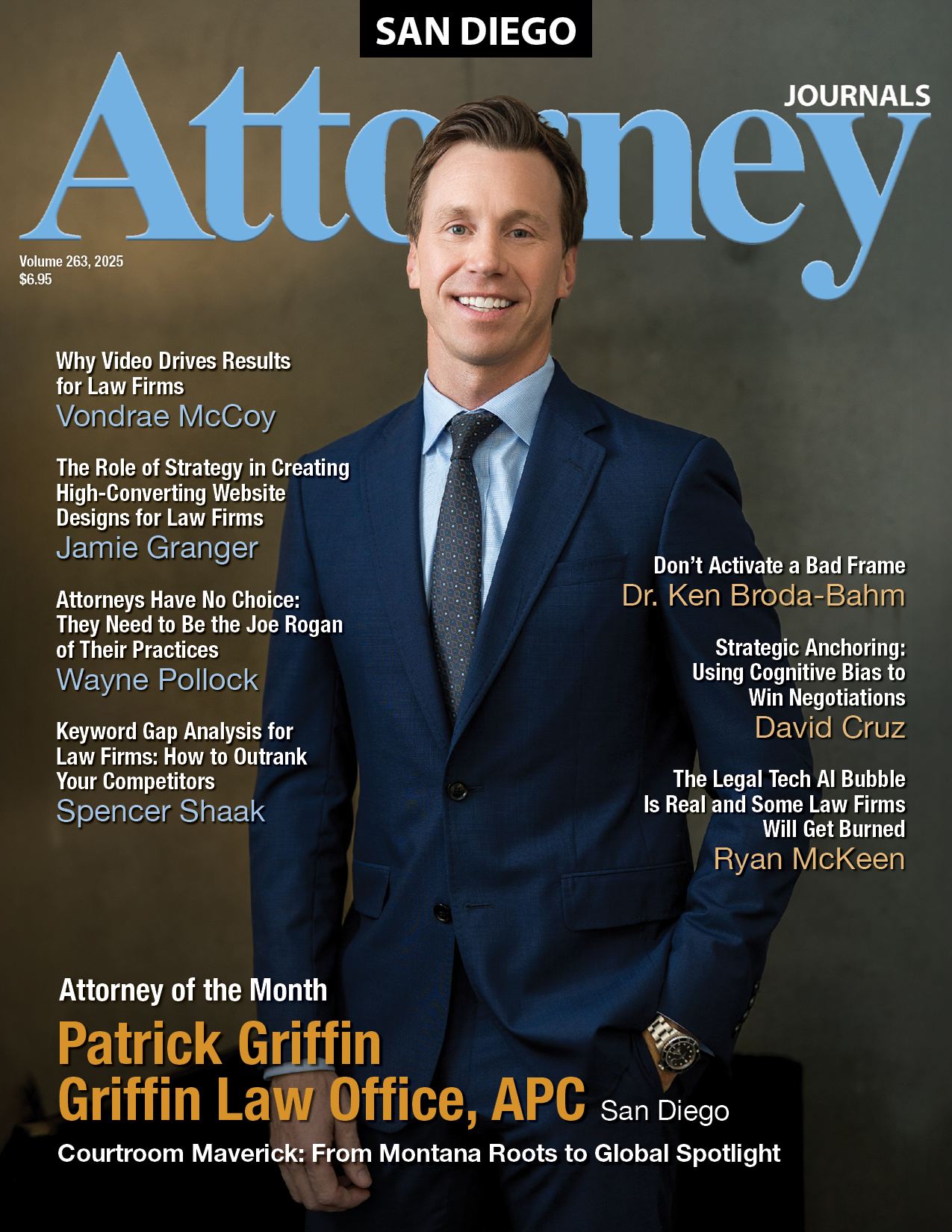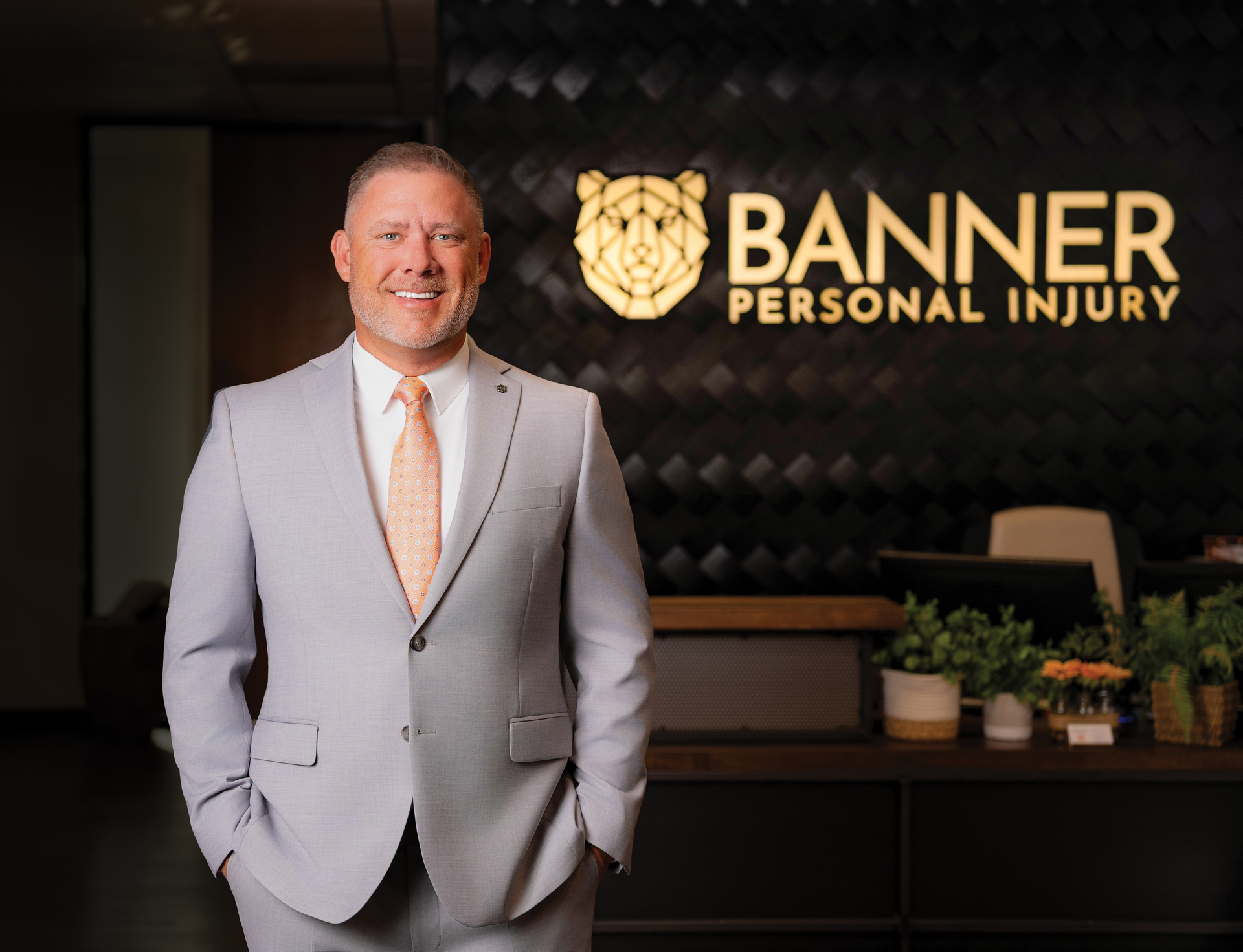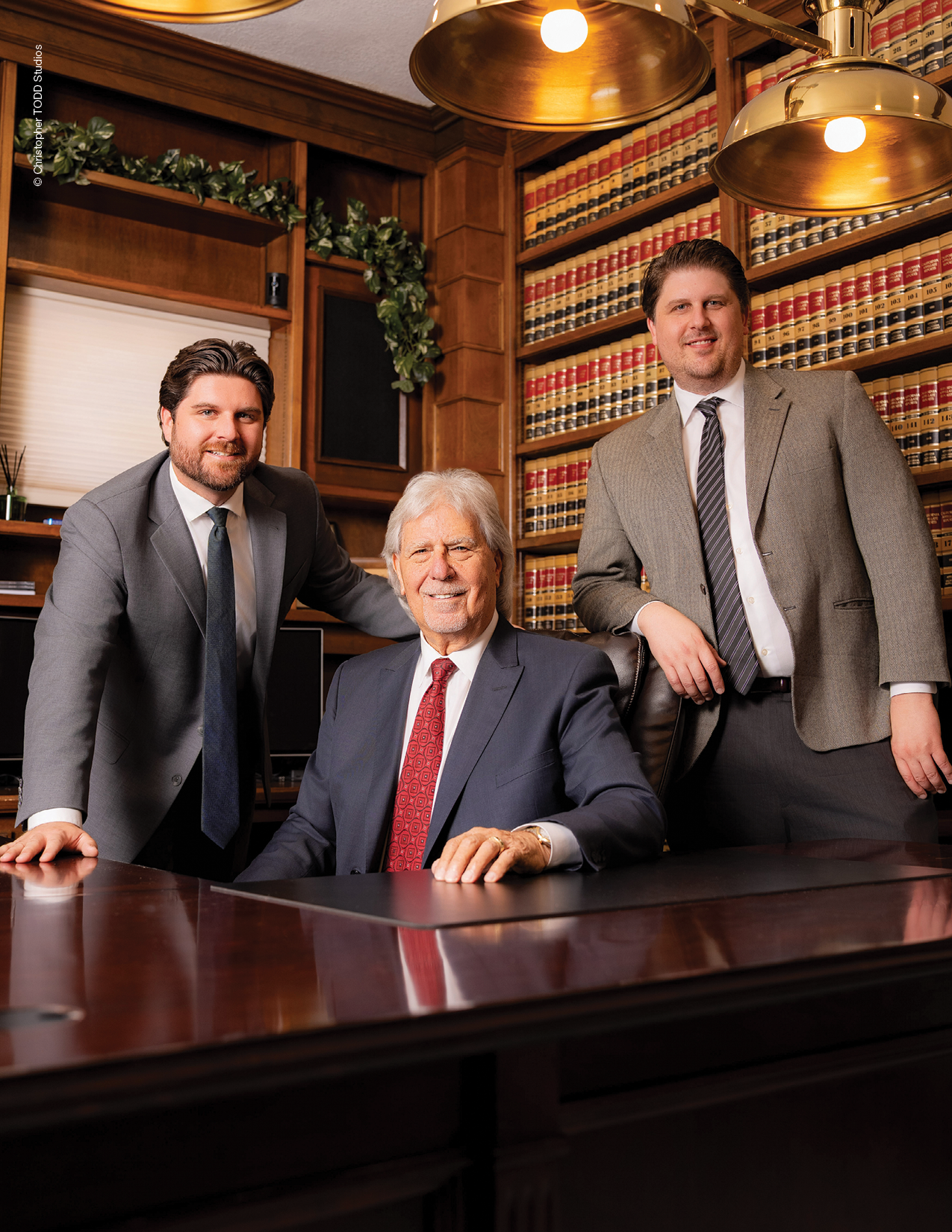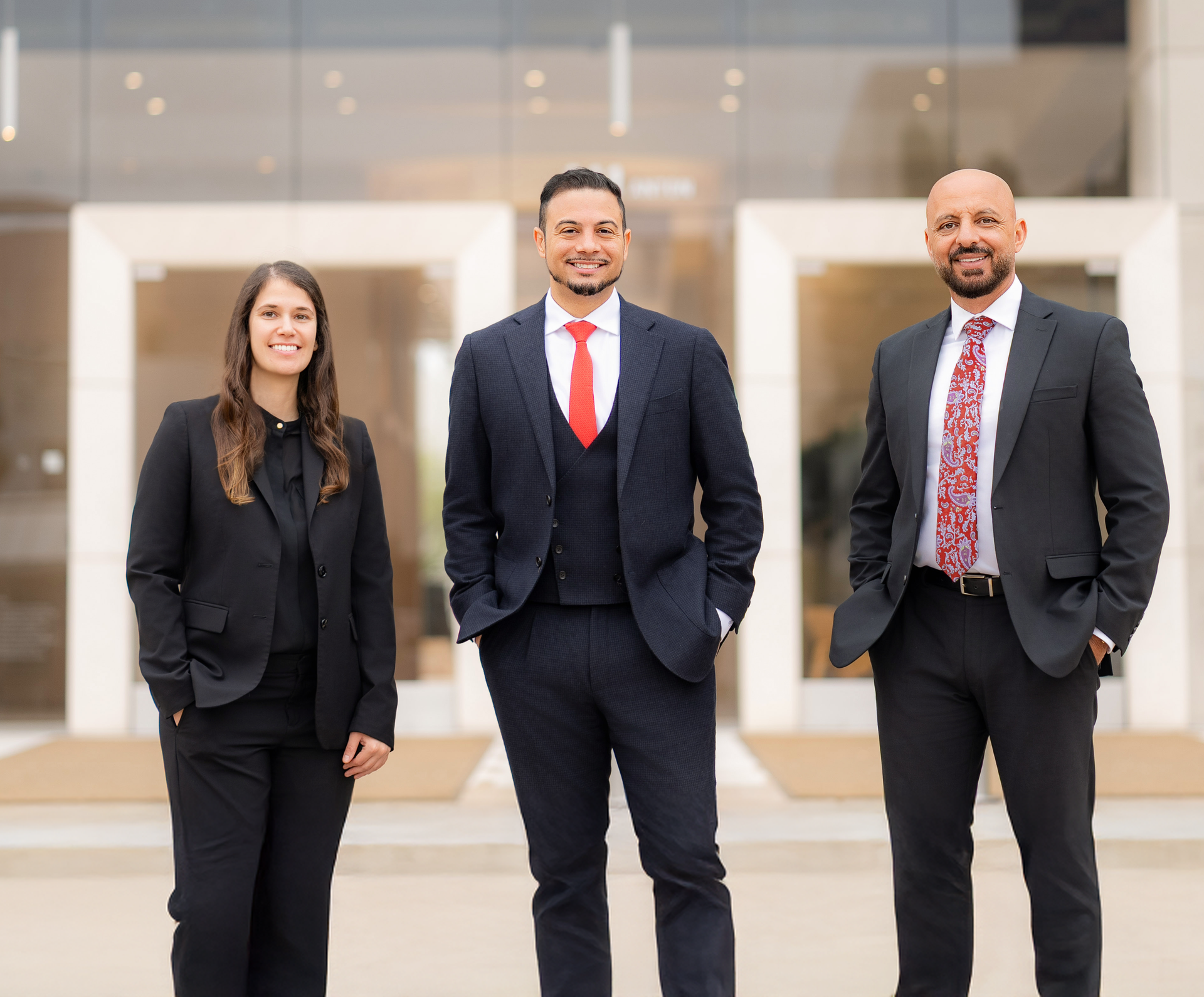Courtroom Maverick: From Montana Roots to Global Spotlight
Contact
Patrick Griffin
Griffin Law Office, APC
1350 Columbia Street, Suite 401
San Diego, CA 92101
Patrick Griffin’s Unbeaten Trial Streak, Groundbreaking Jury Selection, and High-Stakes Federal Defense Have Redefined His Practice
When Patrick Griffin last appeared on the cover of Attorney Journals in 2018, he was known for blending a small-town Montana work ethic with razor-sharp trial skills. Even then, he had earned a reputation as a fierce, principled criminal defense lawyer—willing to fight cases that others would walk away from. Seven years later, Griffin has not only held onto those roots, he’s built an unmatched winning streak in the courtroom, pioneered a novel jury selection method that’s kept him undefeated since its adoption, and led the defense in the largest international criminal investigation ever undertaken.
“Growing up in rural Montana taught me the importance of integrity and reputation,” Griffin says. “When you’re from a small town, you can’t cut corners; people know who you are. That still guides how I handle every case.”
An Office Built for Precision
The most visible change since Griffin’s last feature is his move into a brand-new office in Little Italy, custom-designed to match the way he works. Every detail was built for efficiency, privacy, and client comfort.
“This is not a big-volume shop,” Griffin says. “We deliberately take on fewer cases so that when someone retains me, I’m the only attorney they deal with. Criminal defense isn’t something you can effectively delegate. My clients deserve—and get—my full attention.”
Joining him in the new space is Keegan Fairfield, a recent addition to the firm. Fairfield relocated from Maine, where he ran a large-volume criminal defense practice. Now he manages case administration and paralegal duties, freeing Griffin to focus entirely on strategy, trial preparation, and courtroom advocacy.
A New Way to Pick a Jury and an Unbroken Streak
Since his last profile, Griffin has refined a unique jury selection process that he describes as a “complete rethinking” of voir dire. The results speak for themselves: he has not lost a trial since implementing it (eight and counting). His peers have noticed, and Griffin was invited to lecture on the method at a major statewide trial practice seminar.
In most courtrooms, jury selection is a juggling act—asking questions, listening for nuance, and trying to read the room while making split-second judgments. Griffin has streamlined that process with a system that collects and organizes data in real time.
As jurors answer scaled questions during voir dire, the responses are scored and analyzed on the spot, giving a clear, data-backed picture of potential bias. That structure frees Griffin to move through the courtroom with purpose—focusing on eye contact, body language, and weaving trial themes into the conversation—while the numbers quietly guide strategy.
The result is a measurable increase in successful cause challenges and panels that are more defense friendly. It’s a blend of analytics and advocacy that’s changing how jury selection is done.
“When you’re from a small town, you can’t cut corners; people know who you are. That still guides how I handle every case.”
The Anom Case, A Global Spotlight
The pinnacle of Patrick Griffin’s recent work came when he was recognized as lead defense counsel in the only U.S. case arising from Operation Trojan Shield—the largest coordinated international criminal investigation ever undertaken. The operation involved law enforcement agencies across 18 countries and led to more than 1,000 arrests executed in a single global sweep.
At the heart of the investigation was Anom, a covert encrypted communications platform built and operated by the FBI. The Bureau used a confidential informant to distribute the phones to criminal networks around the world. Unbeknownst to users, every message—more than 27 million in total—was duplicated and sent directly to the FBI, without the use of lawful warrants.
While the arrests spanned dozens of jurisdictions, the U.S. government filed only one case—a RICO indictment in San Diego—which became the legal centerpiece of the entire operation. Griffin was widely recognized by the court and the defense bar as lead counsel.
Griffin led the constitutional challenge to the surveillance program, ultimately forcing the U.S. government to reveal the identity of a previously classified foreign partner that helped facilitate the global interception. “They claimed national security, law enforcement privilege, state secrets—everything,” Griffin says. “But the court still ordered disclosure. That ruling remains unique anywhere in the world.”
The case drew sustained international media attention, with coverage from The New York Times, The Washington Post, BBC, The Guardian, and VICE, among others. It is now being adapted into a Netflix feature film, produced by Jason Bateman, with development focused on the undercover operation and the legal battles that followed.
“Handling a case of this magnitude required both strategic litigation and technical precision,” Griffin says. “The pretrial rulings we secured had a real impact on the structure and scope of the prosecution.”
Case Wins That Define a Career—Felony Domestic Violence Full Acquittal
In one of his most emotionally charged cases, Griffin’s client faced multiple felonies—domestic violence, assault with force likely to produce great bodily injury, false imprisonment, and child endangerment. The charges were strikes and carried the real possibility of years in state prison.
From the outset, Griffin dismantled the prosecution’s case. The complaining witness had given several different versions of events, including one on the stand. Griffin cross-examined her on every inconsistency, introduced text messages that undermined her credibility, and exposed investigative failures by law enforcement. He successfully kept damaging hearsay from the client’s four-year-old child out of trial, and when the prosecution inadvertently opened the door, he got his client’s full statement admitted without him having to testify.
The jury returned not guilty verdicts on every count. “Every juror stayed afterward to talk,” Griffin says. “One hugged my client as he cried in his arms. Moments like that make all of the long hours worth it.”
The Disabled Marine Felony DUI Trial
In another high-stakes trial, Griffin defended a 30-year-old disabled Marine combat veteran in what, on the surface, looked like an unwinnable case. He faced felony DUI with injury, hit-and-run, and filing a false police report—charges carrying up to 14 years in prison. The alleged victim was left paralyzed after the collision. Lab results showed a high blood alcohol concentration, marijuana levels “off the charts,” and Xanax in his system.
This was no routine DUI trial—it was a hyper-technical, multi-issue case that demanded precise navigation. The defense had to juggle multiple expert witnesses, conflicting scientific evidence, and complex legal theories, all while countering the emotional weight of the injuries involved. Complicating matters further, the client had fled the scene and later called in a false police report—facts the prosecution seized on to argue “consciousness of guilt.”
Griffin’s new, data-driven jury selection technique became a critical advantage. By scoring jurors’ answers to scaled questions in real time, he removed anyone with strong negative views on marijuana or alcohol, ensuring a panel willing to weigh the science and the story.
In trial, the defense methodically dismantled the state’s case. Griffin seized on every one of the arresting officer’s mistakes through detailed and precise cross-examination. The prosecution’s toxicology expert conceded she could not determine impairment from drug levels alone. Multiple defense experts testified about the effects of PTSD and prescribed medical marijuana on the client’s baseline, explaining how the lab results were consistent with treatment, not intoxication.
A pivotal moment came when Griffin shifted the focus from raw numbers to the man behind them—introducing compelling testimony about the client’s decorated military service and combat trauma. That humanization, combined with the technical dismantling of the prosecution’s case, overcame the stacked odds.
The result: ten of the twelve jurors voted not guilty. The judge quickly dismissed the serious DUI charge and placed the client on probation for the hit-and-run. “That case was about telling the full human story,” Griffin says. “And it started with getting the right jurors in the box.”
“The second you forfeit credibility, whether with a jury or a client, you’re done.”
Two Federal Drug Trafficking Cases, Both Dismissed
Griffin achieved what most defense lawyers only dream about: full dismissals in two separate federal drug importation cases each carrying mandatory minimum sentences.
In both, his clients were accused of knowingly transporting over 20 kilograms of methamphetamine concealed in a spare tire. Griffin built both defenses around the “blind mule” theory, meticulously investigating in the U.S. and Mexico, using top concealment experts, and documenting every detail showing lack of knowledge.
“Blind mule defenses are rarely successful,” he notes. “But when you combine deep investigation with credible experts and a clear client profile, you can make it real for a prosecutor and make dismissal the smart choice.”
Technology with a Human Purpose
While Griffin is quick to point out that his practice will never lose its personal touch, he has embraced technology in a way that makes him more accessible to clients. All communications, texts, messages, and updates are shared in real-time among Griffin and his staff, eliminating the bottlenecks and delays that frustrate clients in high-stakes situations.
For Griffin, artificial intelligence is simply another tool in a larger system designed to serve clients better and move faster, without compromising judgment or discretion. The goal is not to automate advocacy, but to amplify it.
Mentoring the Next Generation
Griffin also invests in the profession’s future, bringing interns and law clerks into the courtroom, showing them not just legal theory, but “what it’s really like.” He makes a point to give them the advice he wishes he’d received as a law student.
“It’s not enough to know the law, you have to know how to earn trust,” he says. “The second you forfeit credibility, whether with a jury or your client, you’re done.”
Fatherhood and Focus
In the years since last being featured in Attorney Journals, Griffin became a father. He says the experience has deepened his perspective on his work and his life.
“Fatherhood brings a new level of discipline and clarity,” Griffin says. “It’s made me even more focused and deliberate in how I work, how I prepare, and how I show up—in court and in life.”
Looking Ahead
Griffin has no plans to expand into a large firm or dilute his hands-on approach. “The plan is to keep it streamlined and efficient,” he says. “We’ll keep taking fewer cases and delivering better results.”
For a lawyer whose Montana upbringing taught him that your word is everything, it’s a strategy that’s as natural as it is effective. Whether he’s securing acquittals, dismantling federal prosecutions, or standing at the center of a case that drew headlines around the world, Patrick Griffin is proving that integrity, and a relentless work ethic, are still the most powerful tools in the courtroom.
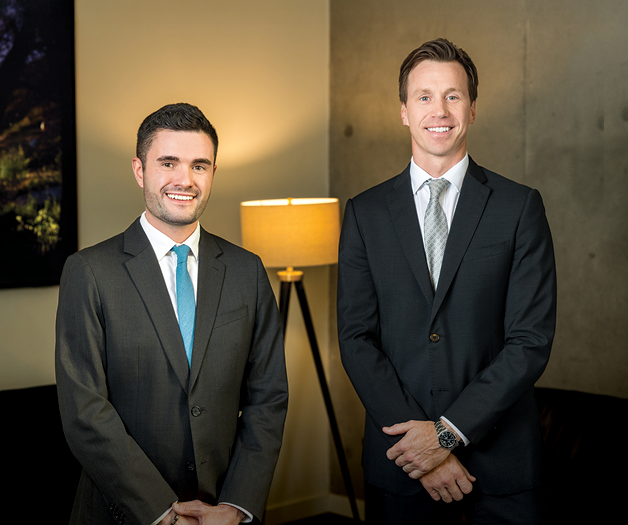
Keegan Fairfield (Office Manager & Paralegal) and Patrick Griffin (Founder)
Recent Case Highlights
- Operation Trojan Shield/Anom Case—Lead Defense
Represented lead defendant in only U.S. case from the largest international criminal prosecution in history. Forced government to disclose classified foreign partner, undermining prosecution. Case now the subject of a Netflix film. - Felony Domestic Violence—Full Acquittal
Client faced multiple felonies, including strike offenses. Griffin exposed nine conflicting witness statements, introduced exculpatory texts, and dismantled police testimony. Jury returned not guilty on all counts. - Disabled Marine DUI—Felony Dismissed
30-year-old Marine vet facing 14 years after a collision left a victim paralyzed. Griffin’s cross-exams neutralized toxicology evidence; jury voted 10–2 for acquittal on DUI with injury. Felony dismissed, probation on hit-and-run. - Federal Drug Importation—Two Cases, Both Dismissed
Each case carried a 10-year mandatory minimum. Griffin built rare “blind mule” defenses supported by expert testimony and international investigation. Prosecutors dismissed both before trial.

